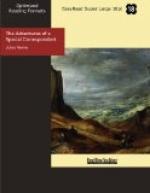Crossing a fertile region where poplars like distaffs rise gracefully erect, skirting fields bristling with vines, running by gardens where fruit trees abound, our train stops at the new town.
As is inevitable since the Russian conquest, there are two towns side by side at Tachkend as at Samarkand, as at Bokhara, as at Merv. Here the old town has tortuous streets, houses of mud and clay, bazaars of poor appearance, caravanserais built of bricks dried in the sun, a few mosques, and schools as numerous as if the czar had decreed by ukase that everything French should be imitated. It is true that the scholars are wanting, but there is no want of schools.
The population of Tachkend does not differ very much from that met with in other parts of Turkestan. It comprises Sarthes, Usbegs, Tadjiks, Khirgizes, Nogais, Israelites, a few Afghans and Hindoos and—as may be naturally supposed—a fair supply of Russians.
It is perhaps at Tachkend that the Jews are gathered in the greatest numbers. And from the day that the town passed under Russian administration their situation has considerably improved. From that epoch dates the complete civil and political liberty they now enjoy.
I have only two hours to spare in visiting the town, and I do my work in true reporter style. You should have seen me dashing through the grand bazaar, a mere wooden building, which is crammed with Oriental stuffs, silk goods, metal ware, specimens of Chinese manufacture, including some very fine examples of porcelain.
In the streets of old Tachkend a certain number of women are to be met with. I need hardly say that there are no slaves in this country, much to the displeasure of the Mussulmans. Nowadays woman is free—even in her household.
“An old Turkoman,” said Major Noltitz, “once told me that a husband’s power is at an end now that he cannot thrash his wife without being threatened with an appeal to the czar; and that marriage is at an end!”
I do not know if the fair sex is still beaten, but the husbands know what they may expect if they knock their wives about. Will it be believed that these peculiar Orientals can see no progress in this prohibition to beat their wives? Perhaps they remember that the Terrestrial Paradise is not far off—a beautiful garden between the Tigris and Euphrates, unless it was between the Amou and the Syr-Daria. Perhaps they have not forgotten that mother Eve lived in this preadamite garden, and that if she had been thrashed a little before her first fault, she would probably not have committed it. But we need not enlarge on that.
I did not hear, as Madam Ujfalvy-Bourdon did, the band playing the Pompiers de Nanterre in the governor-general’s garden. No! On this occasion they were playing Le Pere la Victoire, and if these are not national airs they are none the less agreeable to French ears.
We left Tachkend at precisely eleven o’clock in the morning. The country through which the Grand Transasiatic is now running is not so monotonous. The plain begins to undulate, for we are approaching the outer ramifications of the eastern orographic system. We are nearing the tableland of the Pamirs. At the same time we continue at normal speed along this section of a hundred and fifty kilometres which separates us from Khodjend.




